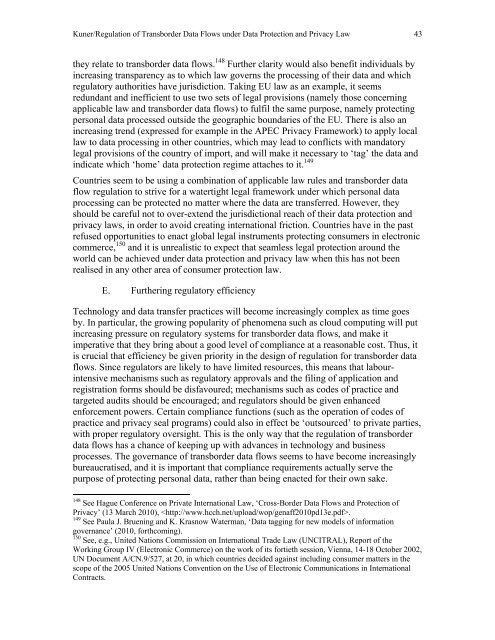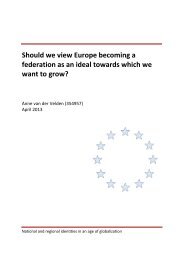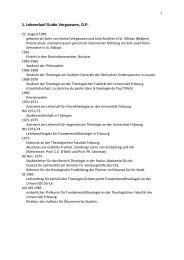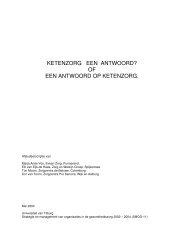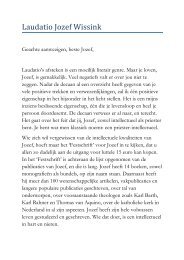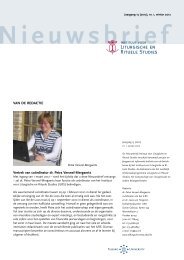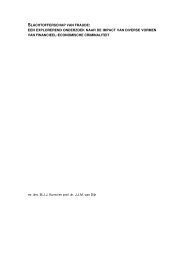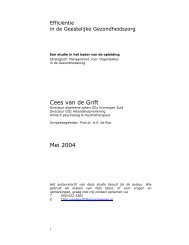Regulation of Transborder Data Flows under ... - Tilburg University
Regulation of Transborder Data Flows under ... - Tilburg University
Regulation of Transborder Data Flows under ... - Tilburg University
Create successful ePaper yourself
Turn your PDF publications into a flip-book with our unique Google optimized e-Paper software.
Kuner/<strong>Regulation</strong> <strong>of</strong> <strong>Transborder</strong> <strong>Data</strong> <strong>Flows</strong> <strong>under</strong> <strong>Data</strong> Protection and Privacy Law 43<br />
they relate to transborder data flows. 148 Further clarity would also benefit individuals by<br />
increasing transparency as to which law governs the processing <strong>of</strong> their data and which<br />
regulatory authorities have jurisdiction. Taking EU law as an example, it seems<br />
redundant and inefficient to use two sets <strong>of</strong> legal provisions (namely those concerning<br />
applicable law and transborder data flows) to fulfil the same purpose, namely protecting<br />
personal data processed outside the geographic boundaries <strong>of</strong> the EU. There is also an<br />
increasing trend (expressed for example in the APEC Privacy Framework) to apply local<br />
law to data processing in other countries, which may lead to conflicts with mandatory<br />
legal provisions <strong>of</strong> the country <strong>of</strong> import, and will make it necessary to ‘tag’ the data and<br />
indicate which ‘home’ data protection regime attaches to it. 149<br />
Countries seem to be using a combination <strong>of</strong> applicable law rules and transborder data<br />
flow regulation to strive for a watertight legal framework <strong>under</strong> which personal data<br />
processing can be protected no matter where the data are transferred. However, they<br />
should be careful not to over-extend the jurisdictional reach <strong>of</strong> their data protection and<br />
privacy laws, in order to avoid creating international friction. Countries have in the past<br />
refused opportunities to enact global legal instruments protecting consumers in electronic<br />
commerce, 150 and it is unrealistic to expect that seamless legal protection around the<br />
world can be achieved <strong>under</strong> data protection and privacy law when this has not been<br />
realised in any other area <strong>of</strong> consumer protection law.<br />
E. Furthering regulatory efficiency<br />
Technology and data transfer practices will become increasingly complex as time goes<br />
by. In particular, the growing popularity <strong>of</strong> phenomena such as cloud computing will put<br />
increasing pressure on regulatory systems for transborder data flows, and make it<br />
imperative that they bring about a good level <strong>of</strong> compliance at a reasonable cost. Thus, it<br />
is crucial that efficiency be given priority in the design <strong>of</strong> regulation for transborder data<br />
flows. Since regulators are likely to have limited resources, this means that labourintensive<br />
mechanisms such as regulatory approvals and the filing <strong>of</strong> application and<br />
registration forms should be disfavoured; mechanisms such as codes <strong>of</strong> practice and<br />
targeted audits should be encouraged; and regulators should be given enhanced<br />
enforcement powers. Certain compliance functions (such as the operation <strong>of</strong> codes <strong>of</strong><br />
practice and privacy seal programs) could also in effect be ‘outsourced’ to private parties,<br />
with proper regulatory oversight. This is the only way that the regulation <strong>of</strong> transborder<br />
data flows has a chance <strong>of</strong> keeping up with advances in technology and business<br />
processes. The governance <strong>of</strong> transborder data flows seems to have become increasingly<br />
bureaucratised, and it is important that compliance requirements actually serve the<br />
purpose <strong>of</strong> protecting personal data, rather than being enacted for their own sake.<br />
148<br />
See Hague Conference on Private International Law, ‘Cross-Border <strong>Data</strong> <strong>Flows</strong> and Protection <strong>of</strong><br />
Privacy’ (13 March 2010), .<br />
149<br />
See Paula J. Bruening and K. Krasnow Waterman, ‘<strong>Data</strong> tagging for new models <strong>of</strong> information<br />
governance’ (2010, forthcoming).<br />
150<br />
See, e.g., United Nations Commission on International Trade Law (UNCITRAL), Report <strong>of</strong> the<br />
Working Group IV (Electronic Commerce) on the work <strong>of</strong> its fortieth session, Vienna, 14-18 October 2002,<br />
UN Document A/CN.9/527, at 20, in which countries decided against including consumer matters in the<br />
scope <strong>of</strong> the 2005 United Nations Convention on the Use <strong>of</strong> Electronic Communications in International<br />
Contracts.


